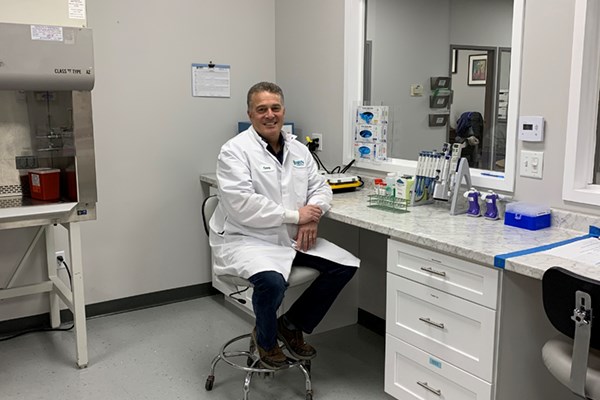Chief Scientific Officer of MRN Diagnostics Works on Rapid Blood Test

03/27/2020
By David Perry
As CEO and chief scientific officer of Franklin, Mass.-based MRN Diagnostics, Gregory Chiklis has spent the past six weeks in a race against the clock, working on a rapid blood test for COVID-19.
Chiklis, who earned a Ph.D. in chemistry from UMass Lowell in 1992, has been working with Chembio Diagnostic Systems on a test designed to diagnose antibodies in people who have contracted the virus. His company’s work included creating synthetic antibodies to develop their tests and to run quality controls using safe noninfectious materials.
Six weeks later, with MRN’s support, Chembio is expecting emergency approval by the U.S. Food and Drug Administration (FDA) of the Chembio Diagnostics DPP COVID-19 IgG/IgM Test, a rapid blood test to identify disease-fighting antibodies in those infected by the virus. Because of the urgent need, antibody tests will enjoy relaxed FDA rules.
Inexpensive and fast, with results in 15 minutes, the new tests should provide scientists with a far better picture of the progression of infection and recovery from the virus. Previous polymerase chain reaction (PCR) tests – the nasal swab tests already familiar to TV news viewers – merely confirm an active infection.
Chiklis, who oversees 39 employees, says it’s been a “scramble” to find a way to defeat the coronavirus. “I don’t think anyone here has had a day off in the last month and a half,” he says. “This has been crazy.”
Chiklis is known for his expertise in providing diagnostic developers with a pathway to accurate tests, from research concept to commercial launch and beyond, along with additional quality control services. His company offers one-stop shopping for those looking to produce tests quickly and accurately.
“The whole focus of our corporation is to make sure patients get accurate test results,” he says.
For more than three decades, Chiklis has played a role in the development of hundreds of tests and the validation of millions of test results. He has worked on a slew of previous viral and disease outbreaks, from severe acute respiratory syndrome (SARS) and the West Nile virus to human immunodeficiency virus (HIV).
The U.S. Centers for Disease Control (CDC) used safe and inactivated SARS virus molecular controls, manufactured using Chiklis’ patented process, to validate molecular tests during the outbreak in 2003. Scientists used these materials to quickly and safely validate the tests they had developed, and patient screening began immediately. That allowed scientists to identify, isolate and stop the outbreak.
“With SARS, we were able to isolate people before it got out of hand,” says Chiklis. “But this time, China waited to tell us, and instead of being prepared for an onslaught, we were behind the eight ball. And I will tell you, I have never seen the scientific community so collaborative. From the CDC on down the line, everyone has been amazing.”
With the West Nile virus, “we were mandated to get a molecular screening test for the blood supply and had six months to get a test done,” he says. “With COVID, everyone worked together and rushed the first tests out in six days. Six days! That’s unprecedented.”
An awareness of the potential consequences of COVID-19 brought a heightened sense of urgency.
“It was a dangerous situation. Young people were mildly affected but very able to infect other portions of the population,” he says.
Chiklis hopes the Chembio Diagnostics DPP COVID-19 IgG/IgM Test will initially be made available to first responders.
“First and foremost, we need to keep them safe. After that, it can be used to identify virus outbreaks on a real-time basis so they can be isolated and shut down,” he says.
Chiklis believes isolation and social distancing are helping to keep the virus from spreading more widely.
“Things should improve in another three or four weeks if that continues,” he says.
Chiklis has developed thousands of research products and quality controls over his career, and in a lab at his facility, he works with a biospecimen archive of more than a quarter-million samples collected globally.
River Hawk Legacy
He joined MRN as CEO in 2018, after 14 years as president and CEO of ZeptoMetrix Corp. His first job after earning his Ph.D. was with the start-up Hemagen Diagnostics.
After finishing his undergraduate work at UMass Amherst in biochemistry in 1986, Chiklis headed to UML, where his roots run deep – it’s where his parents, Joan and Charles Chiklis, met.
His father is a triple River Hawk, having earned his B.S. ’55, M.S. ’56 and Ph.D. ’64 degrees in chemistry. His mother earned a bachelor’s degree in education.
Chiklis also met his wife, Fadwah, at UML; she was a senior in chemistry when he began his Ph.D. program. He’s been a member of the Kennedy College of Sciences advisory board since 2016.
The university figures “in everything I do,” he says. “I got to grad school, and that’s when the professors taught me how to think. That’s when my education took place. They helped me develop an entire scientific toolbox to be ready for industry. I’m in a much better place because of professors like my advisor, Dr. Edwin Jahngen.”
In the spring of 1987, Chiklis’ father was invited to address the plastics department’s graduating class. At the time, Charles Chiklis was the advisor to the director of chemicals and materials in research and development for Polaroid.
The elder Chiklis had prescient advice for the grads.
“Scientists standing at the threshold of the unknown must never forget their responsibility for the betterment of mankind,” he said. “The scientists of today have to be responsive, innovative, creative and ever-attentive to the needs of society.”
